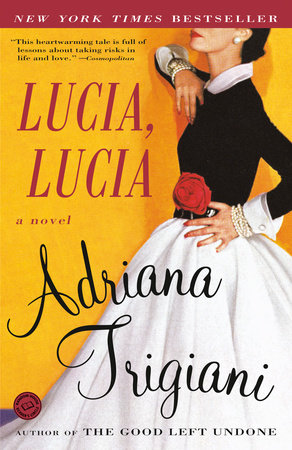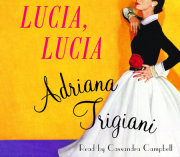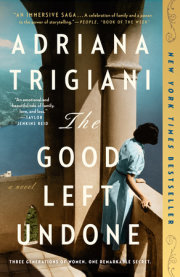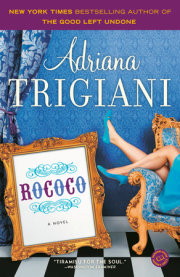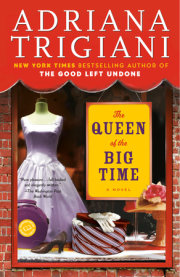CHAPTER ONE From her window Kit Zanetti can see absolutely everything that happens on Commerce Street. The name doesn’t really suit the street; it should be called Winding Trail, or Lavender Lane, or Rue de Gem. Greenwich Village doesn’t get any more enchanting than this at night, with the puddles of blue light around the roots of old trees that grow a few feet apart on either side of the street; or any lovelier by day, when the sun bakes the connecting row houses, none more than four stories high, some festooned in ivy, a few white clapboard with black-licorice trim, and one storefront so old that the brick façade has faded from maroon to pale orange. The brownstone stoops are hemmed with old terra-cotta pots containing whatever flowers grow in the shade, usually pink and white impatiens. The sidewalks are uneven, the concrete squares like slabs of layer cake. The shutters that swing from the windows are painted mottled shades of cream and Mamie pink, a powdery peach tone not seen since the Eisenhower administration (it appears the shutters have not been painted since then, either).
This is the ideal home for a playwright, clusters of buildings filled with stories and people whose quirks play out with small-town regularity. Every morning Kit sits in the window while her coffee brews, and witnesses the same scene. A petite woman with shocking red hair walks a Great Dane as tall as she is, and as they turn the corner, she yanks the leash, and he leaps into the air, setting off the car alarm in the Chevy Nova. On the opposite corner, a bald accountant in a suit the color of a Tootsie Roll emerges from his basement apartment, looks up at the sky, takes a deep breath, and hails a cab. Finally, the superintendent from the apartment building across the street comes out of the foyer, hops on his stripped-down bike (essentially two wheels connected by a coat hanger), throws a broom over his shoulder, and rides off, looking very World War II Italy.
There is a loud knock at the door. Kit is expecting her landlord and super, Tony Sartori, to stop by and unclog her sink for the tenth time this year. The tenants have never seen a professional anybody (plumber, electrician, painter) with actual tools work in the building. Everything in this building, from the wiring to the gas to the pipes, is fixed by Tony with duct tape. The tape thing became so funny that Kit cut out a magazine article about how Miss America contestants create cleavage under their evening gowns by hoisting their breasts with duct tape, and put it in her rent envelope. Mr. Sartori never mentioned receiving the article, but he began addressing Kit as Miss Pennsylvania.
“I’m coming,” Kit calls out sweetly in the high-pitched, grateful tone of a renter who doesn’t want to be any trouble. She opens the door. “Oh, Aunt Lu.” Lu is not actually Kit’s aunt, but everyone in the building calls her “aunt,” so Kit does, too. Sometimes Lu leaves gifts for Kit outside the door—a small bag of expensive coffee beans, a bar of lilac soap, a sample box of tiny perfume bottles—with a note that says, “Enjoy!” in big, cursive handwriting. The stationery, small ecru cards with a gold “L” engraved on them, is uptown tasteful.
Lu smiles warmly. “How are you?” She lives upstairs in the back apartment and is the only other single woman in Kit’s building. She’s in her seventies, but she has the chic look of New York’ s older ladies who stay in the moment. Her hair is done, her lipstick applied in the latest shade of fiery fuchsia, and she wears a vintage Hermès scarf wrapped around her neck and anchored by a sparkly brooch. Aunt Lu is trim and small. Her perfume is spicy and youthful, not flowery like a grandmother’s.
“I thought you were Mr. Sartori,” Kit says.
“What happened?” Lu peers into the apartment, expecting to see water gushing from the ceiling or worse.
“The sink. It’s clogged again. And it won’ t open up no matter what I do. I plunged. I prayed. I used enough Drano to blow up Brooklyn.”
“If I see Tony, I’ll tell him to get up here and fix it immediately.”
“Thanks.” If anybody has an in with the landlord, it’s Aunt Lu. After all, she is a blood relative.
Aunt Lu pulls on her gloves. “I was wondering if you were busy this afternoon. I’d love to have you up for tea.”
She has never invited Kit up to her place. They both know and live by the unwritten rules of apartment dwelling. It’s best to keep a distance from neighbors in a small building; cordial greetings by the mailbox are acceptable, but beyond that it gets dicey, since there is nothing worse than a fellow tenant who stops by too much, chats too long, and borrows things. Kit says, “Thanks, but I’m writing. Maybe we can do it another time.”
“Sure, whenever you can, you let me know. I’ve been cleaning out my apartment, and I have lots of things I think you might like”—Lu looks around the apartment—“or could use.”
Kit reconsiders. Nothing is more alluring than a free indoor flea market without other customers to beat to the prizes. And Aunt Lu reminds Kit of her own grandmother. She also seems self-sufficient and has an air of discernment, something Kit would like to cultivate. How many women can wear an enormous enamel dragonfly brooch and pull it off? “Maybe I can make it around four.”
“I would love that!” Lu says, smiling. “See you then.”
“How ya doin’, Aunt Lu?” Tony Sartori asks as he climbs the stairs to Kit’s apartment.
“I’m fine, but Kit’s drain has seen better days.” Aunt Lu winks at Kit as Mr. Sartori enters the apartment.
“Yeah, yeah, it’s always something around here,” he grouses.
Lu grabs the hand railing and makes her way down the narrow stairwell. It’s early October and not too chilly outside, maybe fifty degrees, but Lu is already wearing her full-length mink coat, which drags the stairs behind her like the cape of a duchess. No matter the temperature, from September to June, Aunt Lu wears that mink coat.
“Come on in.” Kit need not invite him, since he’s already in the bathroom. “Aunt Lu’s a pretty lady,” she tells him, hoping to score some points.
You kiddin’ me? In her day, she was a looker. They say she was the most bee-yoo-tee-ful gal in the Village.”
“Really?”
“Yep. You said you had a leak.”
“A clog. In the bathroom sink,” Kit corrects him.
“Again?” he says in a tone that implies it’s Kit’s fault. Tony Sartori is a small man with white hair and black eyebrows that look like thick hedges. He looks enough like Gepetto, the gentle cobbler in Pinocchio, to make Kit feel safe, but his vocal tone is pure New York rasp, which scares her a little.
Kit laughs nervously. “Sorry. You know I spend my nights stuffing the drain with olive pits so you have to spend your days fixing it.”
Tony Sartori looks as though he may yell, but he smiles instead. “Remain calm, Miss Pennsylvania. I’ll fix it.”
Kit grins weakly but knows better. He’ll plunge the sink and then wrap some crappy tape around the hole in the pipe and return in two weeks when the sticky stuff comes undone and she has another flood.
“We might have to get a plumber this time,” he says from under the sink.
“Hallelujah!” Kit claps her hands together joyfully.
Sartori grips the sink and pulls himself to a standing position. Kit’s bathroom is wallpapered floor to ceiling with rejection letters from every regional theater in the nation, from Alaska Rep to the Wyoming Traveling Players. They are all variations of the same message: good characters, good dialogue, but “you don’t know how to tell a story, Ms. Zanetti.” Tony Sartori reads one and shakes his head. “Don’t you ever want to give up? I mean, with letters like these, what’s the point?”
“I’m getting better,” Kit tells him.
“Maybe you are. But evidently there aren’t a lot of people out there in the theater world who think you can write a play.” Sartori shrugs. “Besides, what is the theater anymore? It’s not like it was. It used to be cheap and wholesome, dancing girls and good music. Now it’s too damn expensive. They herd you in like cows, and then the seats are so small, you get a blood clot in your leg before the first song is over. My wife loves that Phantom of the Opera show. I thought it was all right. To me it’s just a guy in a mask scaring a girl with a good figure and then singing about it.”
“The reviews are in!” Kit says cheerfully. She is used to the barbs, criticisms, and comparisons that come with her chosen profession. Playwriting as a career is pathetic. A writer can’t make a living, and in this culture, plays are about as relevant as glassblowing or whittling forks out of wood. Kit will keep these thoughts to herself, since the last thing she needs is an artistic standoff with Tony Sartori.
“That’s just my opinion.” Mr. Sartori spins the roll of duct tape on his index finger and goes to the door. “Can you hold off using the sink for a while?”
Copyright © 2003 by Adriana Trigiani. All rights reserved. No part of this excerpt may be reproduced or reprinted without permission in writing from the publisher.

